Lixiang Yan
From Passive Tool to Socio-cognitive Teammate: A Conceptual Framework for Agentic AI in Human-AI Collaborative Learning
Aug 20, 2025

Abstract:The role of Artificial Intelligence (AI) in education is undergoing a rapid transformation, moving beyond its historical function as an instructional tool towards a new potential as an active participant in the learning process. This shift is driven by the emergence of agentic AI, autonomous systems capable of proactive, goal-directed action. However, the field lacks a robust conceptual framework to understand, design, and evaluate this new paradigm of human-AI interaction in learning. This paper addresses this gap by proposing a novel conceptual framework (the APCP framework) that charts the transition from AI as a tool to AI as a collaborative partner. We present a four-level model of escalating AI agency within human-AI collaborative learning: (1) the AI as an Adaptive Instrument, (2) the AI as a Proactive Assistant, (3) the AI as a Co-Learner, and (4) the AI as a Peer Collaborator. Grounded in sociocultural theories of learning and Computer-Supported Collaborative Learning (CSCL), this framework provides a structured vocabulary for analysing the shifting roles and responsibilities between human and AI agents. The paper further engages in a critical discussion of the philosophical underpinnings of collaboration, examining whether an AI, lacking genuine consciousness or shared intentionality, can be considered a true collaborator. We conclude that while AI may not achieve authentic phenomenological partnership, it can be designed as a highly effective functional collaborator. This distinction has significant implications for pedagogy, instructional design, and the future research agenda for AI in education, urging a shift in focus towards creating learning environments that harness the complementary strengths of both human and AI.
Modifying AI, Enhancing Essays: How Active Engagement with Generative AI Boosts Writing Quality
Dec 10, 2024Abstract:Students are increasingly relying on Generative AI (GAI) to support their writing-a key pedagogical practice in education. In GAI-assisted writing, students can delegate core cognitive tasks (e.g., generating ideas and turning them into sentences) to GAI while still producing high-quality essays. This creates new challenges for teachers in assessing and supporting student learning, as they often lack insight into whether students are engaging in meaningful cognitive processes during writing or how much of the essay's quality can be attributed to those processes. This study aimed to help teachers better assess and support student learning in GAI-assisted writing by examining how different writing behaviors, especially those indicative of meaningful learning versus those that are not, impact essay quality. Using a dataset of 1,445 GAI-assisted writing sessions, we applied the cutting-edge method, X-Learner, to quantify the causal impact of three GAI-assisted writing behavioral patterns (i.e., seeking suggestions but not accepting them, seeking suggestions and accepting them as they are, and seeking suggestions and accepting them with modification) on four measures of essay quality (i.e., lexical sophistication, syntactic complexity, text cohesion, and linguistic bias). Our analysis showed that writers who frequently modified GAI-generated text-suggesting active engagement in higher-order cognitive processes-consistently improved the quality of their essays in terms of lexical sophistication, syntactic complexity, and text cohesion. In contrast, those who often accepted GAI-generated text without changes, primarily engaging in lower-order processes, saw a decrease in essay quality. Additionally, while human writers tend to introduce linguistic bias when writing independently, incorporating GAI-generated text-even without modification-can help mitigate this bias.
From Complexity to Parsimony: Integrating Latent Class Analysis to Uncover Multimodal Learning Patterns in Collaborative Learning
Nov 23, 2024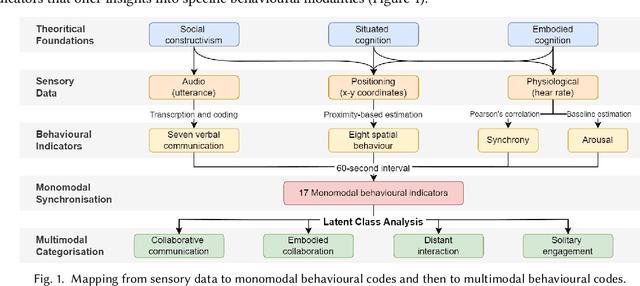
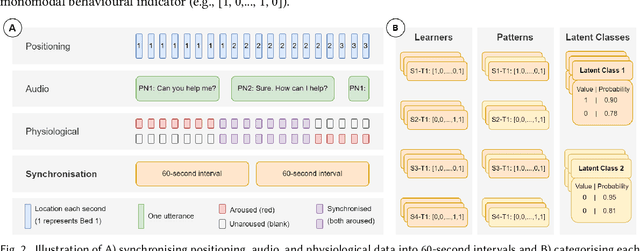
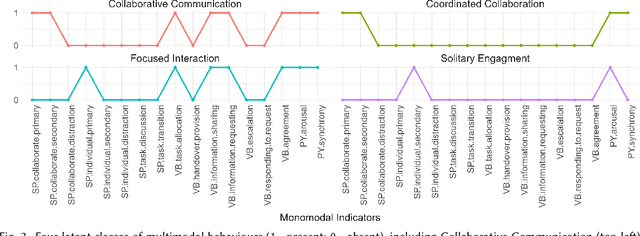
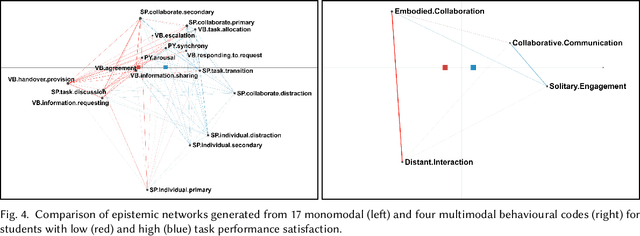
Abstract:Multimodal Learning Analytics (MMLA) leverages advanced sensing technologies and artificial intelligence to capture complex learning processes, but integrating diverse data sources into cohesive insights remains challenging. This study introduces a novel methodology for integrating latent class analysis (LCA) within MMLA to map monomodal behavioural indicators into parsimonious multimodal ones. Using a high-fidelity healthcare simulation context, we collected positional, audio, and physiological data, deriving 17 monomodal indicators. LCA identified four distinct latent classes: Collaborative Communication, Embodied Collaboration, Distant Interaction, and Solitary Engagement, each capturing unique monomodal patterns. Epistemic network analysis compared these multimodal indicators with the original monomodal indicators and found that the multimodal approach was more parsimonious while offering higher explanatory power regarding students' task and collaboration performances. The findings highlight the potential of LCA in simplifying the analysis of complex multimodal data while capturing nuanced, cross-modality behaviours, offering actionable insights for educators and enhancing the design of collaborative learning interventions. This study proposes a pathway for advancing MMLA, making it more parsimonious and manageable, and aligning with the principles of learner-centred education.
Generative AI in Higher Education: A Global Perspective of Institutional Adoption Policies and Guidelines
May 20, 2024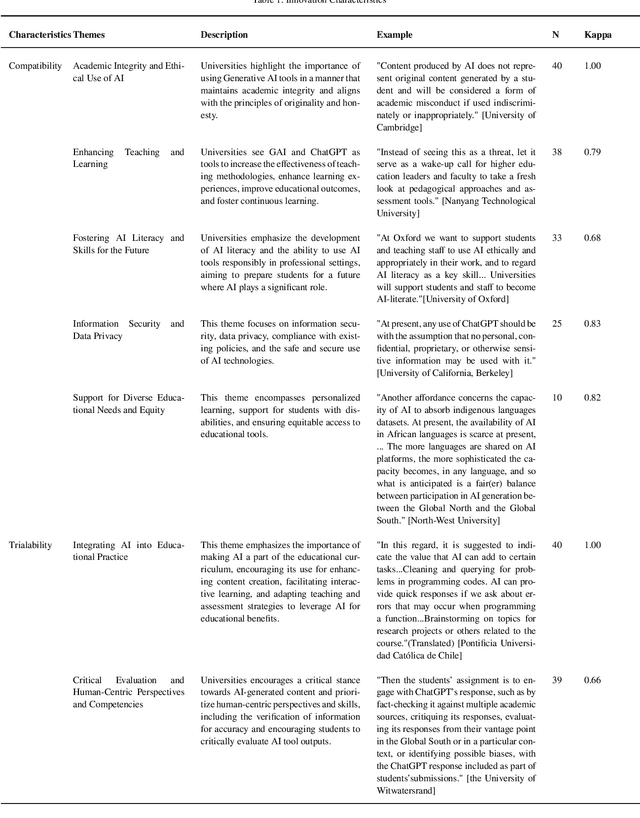
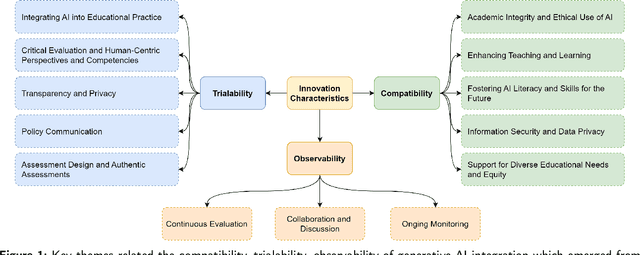
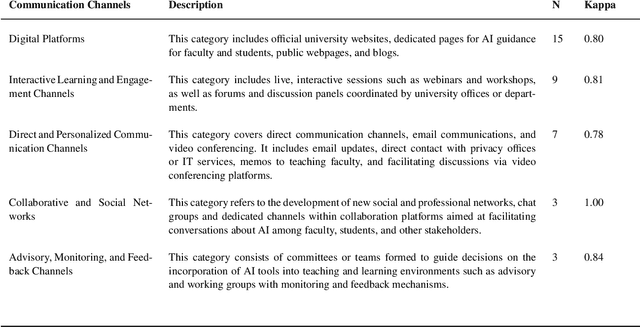
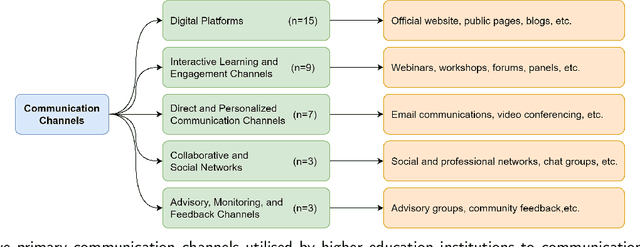
Abstract:Integrating generative AI (GAI) into higher education is crucial for preparing a future generation of GAI-literate students. Yet a thorough understanding of the global institutional adoption policy remains absent, with most of the prior studies focused on the Global North and the promises and challenges of GAI, lacking a theoretical lens. This study utilizes the Diffusion of Innovations Theory to examine GAI adoption strategies in higher education across 40 universities from six global regions. It explores the characteristics of GAI innovation, including compatibility, trialability, and observability, and analyses the communication channels and roles and responsibilities outlined in university policies and guidelines. The findings reveal a proactive approach by universities towards GAI integration, emphasizing academic integrity, teaching and learning enhancement, and equity. Despite a cautious yet optimistic stance, a comprehensive policy framework is needed to evaluate the impacts of GAI integration and establish effective communication strategies that foster broader stakeholder engagement. The study highlights the importance of clear roles and responsibilities among faculty, students, and administrators for successful GAI integration, supporting a collaborative model for navigating the complexities of GAI in education. This study contributes insights for policymakers in crafting detailed strategies for its integration.
Human-Centred Learning Analytics and AI in Education: a Systematic Literature Review
Dec 20, 2023Abstract:The rapid expansion of Learning Analytics (LA) and Artificial Intelligence in Education (AIED) offers new scalable, data-intensive systems but also raises concerns about data privacy and agency. Excluding stakeholders -- like students and teachers -- from the design process can potentially lead to mistrust and inadequately aligned tools. Despite a shift towards human-centred design in recent LA and AIED research, there remain gaps in our understanding of the importance of human control, safety, reliability, and trustworthiness in the design and implementation of these systems. We conducted a systematic literature review to explore these concerns and gaps. We analysed 108 papers to provide insights about i) the current state of human-centred LA/AIED research; ii) the extent to which educational stakeholders have contributed to the design process of human-centred LA/AIED systems; iii) the current balance between human control and computer automation of such systems; and iv) the extent to which safety, reliability and trustworthiness have been considered in the literature. Results indicate some consideration of human control in LA/AIED system design, but limited end-user involvement in actual design. Based on these findings, we recommend: 1) carefully balancing stakeholders' involvement in designing and deploying LA/AIED systems throughout all design phases, 2) actively involving target end-users, especially students, to delineate the balance between human control and automation, and 3) exploring safety, reliability, and trustworthiness as principles in future human-centred LA/AIED systems.
Generative Artificial Intelligence in Learning Analytics: Contextualising Opportunities and Challenges through the Learning Analytics Cycle
Nov 30, 2023Abstract:Generative artificial intelligence (GenAI), exemplified by ChatGPT, Midjourney, and other state-of-the-art large language models and diffusion models, holds significant potential for transforming education and enhancing human productivity. While the prevalence of GenAI in education has motivated numerous research initiatives, integrating these technologies within the learning analytics (LA) cycle and their implications for practical interventions remain underexplored. This paper delves into the prospective opportunities and challenges GenAI poses for advancing LA. We present a concise overview of the current GenAI landscape and contextualise its potential roles within Clow's generic framework of the LA cycle. We posit that GenAI can play pivotal roles in analysing unstructured data, generating synthetic learner data, enriching multimodal learner interactions, advancing interactive and explanatory analytics, and facilitating personalisation and adaptive interventions. As the lines blur between learners and GenAI tools, a renewed understanding of learners is needed. Future research can delve deep into frameworks and methodologies that advocate for human-AI collaboration. The LA community can play a pivotal role in capturing data about human and AI contributions and exploring how they can collaborate most effectively. As LA advances, it is essential to consider the pedagogical implications and broader socioeconomic impact of GenAI for ensuring an inclusive future.
Human-AI Collaboration in Thematic Analysis using ChatGPT: A User Study and Design Recommendations
Nov 07, 2023Abstract:Generative artificial intelligence (GenAI) offers promising potential for advancing human-AI collaboration in qualitative research. However, existing works focused on conventional machine-learning and pattern-based AI systems, and little is known about how researchers interact with GenAI in qualitative research. This work delves into researchers' perceptions of their collaboration with GenAI, specifically ChatGPT. Through a user study involving ten qualitative researchers, we found ChatGPT to be a valuable collaborator for thematic analysis, enhancing coding efficiency, aiding initial data exploration, offering granular quantitative insights, and assisting comprehension for non-native speakers and non-experts. Yet, concerns about its trustworthiness and accuracy, reliability and consistency, limited contextual understanding, and broader acceptance within the research community persist. We contribute five actionable design recommendations to foster effective human-AI collaboration. These include incorporating transparent explanatory mechanisms, enhancing interface and integration capabilities, prioritising contextual understanding and customisation, embedding human-AI feedback loops and iterative functionality, and strengthening trust through validation mechanisms.
Practical and Ethical Challenges of Large Language Models in Education: A Systematic Literature Review
Mar 17, 2023
Abstract:Educational technology innovations that have been developed based on large language models (LLMs) have shown the potential to automate the laborious process of generating and analysing textual content. While various innovations have been developed to automate a range of educational tasks (e.g., question generation, feedback provision, and essay grading), there are concerns regarding the practicality and ethicality of these innovations. Such concerns may hinder future research and the adoption of LLMs-based innovations in authentic educational contexts. To address this, we conducted a systematic literature review of 118 peer-reviewed papers published since 2017 to pinpoint the current state of research on using LLMs to automate and support educational tasks. The practical and ethical challenges of LLMs-based innovations were also identified by assessing their technological readiness, model performance, replicability, system transparency, privacy, equality, and beneficence. The findings were summarised into three recommendations for future studies, including updating existing innovations with state-of-the-art models (e.g., GPT-3), embracing the initiative of open-sourcing models/systems, and adopting a human-centred approach throughout the developmental process. These recommendations could support future research to develop practical and ethical innovations for supporting diverse educational tasks and benefiting students, teachers, and institutions.
 Add to Chrome
Add to Chrome Add to Firefox
Add to Firefox Add to Edge
Add to Edge